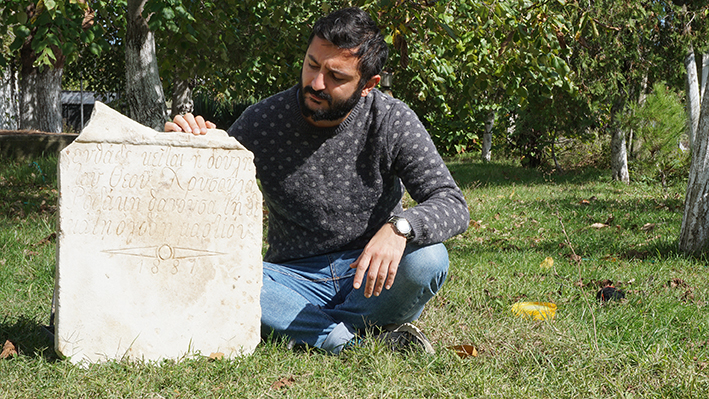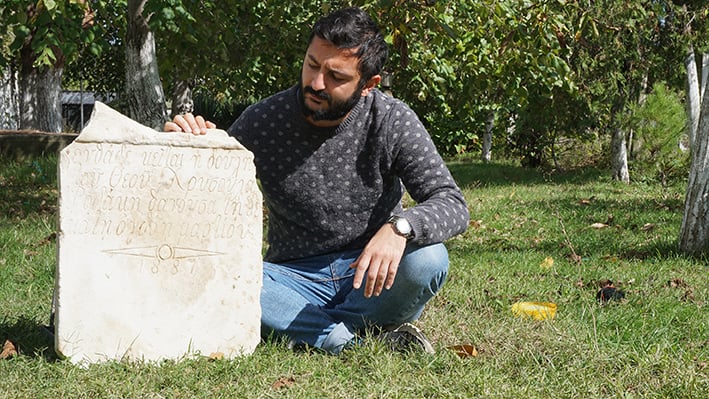History revived by a tombstone


Actually, we know everything. Those who see history through a door that opens to the truth know and speak it aloud, and there are others who also know, but do not want to believe what they know, and wish to forget what they know. When a text written in a language foreign to the “majority” Turks emerges from a hitherto closed off corner of Anatolia, in fact anywhere in Turkey, above or below ground, we can guess what possibilities it points to. We seem to be sure that that writing is in Greek or Armenian, that there is a history behind it that has changed direction with a story of pogrom, population exchange or genocide, and that that writing is connected to the former owners of that geography.
It is not hard to imagine that whatever it is, when it comes to light today, it will only evoke the connotations of treasure and trove for some people. But there will also be those who decide to pursue this bond, who want to find, commemorate and pay homage to the old inhabitants, and thus make sense of the present, and someone will wake history from its slumber. This will be a difficult path, there will be those who don't want to talk about it, there will be those who will approach it only for self-interest; official records and archives will not provide much guidance, and even if we are not soothsayer, we sense that these things will happen. The documentary film Looking for Rodakis takes its course from exactly this point. We anticipate the story of such a search from the very first minute, but we watch as if we were reading a novel, wishing for a happy ending, as the story that begins with a tombstone found in a house in Çatalca is connected to a family tree in Greece. We know everything, yet the most possible happy ending left for this century, that reunion, that moment of two ends meeting, brings tears to our eyes.
School on cemetery
An old house built with traditional architecture in Karacaköy, Çatalca, 100 km away from Istanbul, looking with a tired face from the past centuries. While the residents of the house, who want to renew the flooring, are working downstairs, they suddenly take a break in amazement, and a tombstone written in the Greek alphabet appears from the ground. When the meaning is deciphered, the following is revealed: “Here lies Chrysoula Rodaki, servant of God, March 1887”. What follows is director Kerem Soyyılmaz's journey in search of the former owners of his grandparents' house. His aunt and cousins, who spent the most time in that house, accompany him on this journey.
It is one of the topics that is not talked about much in the village without being asked. But when someone is really curious and asks, of course there are those who talk about the old Greek residents of the village before the exchange. Those who came from somewhere in Greece in buses over the years, looking for their grandfather's house... The old church is now flattened; in an irony of history, there is a school where the cemetery used to be. Another movie, in which treasure legends are added end to end, flows on the faces of some people from Karacaköy who come to look at the stone with curiosity. This cannot be overlooked. Someone can no longer hold back what is on the tip of his tongue: "Why shouldn't there be gold bullion in it?" Back in the day, a helicopter was used for treasure hunt, whether it was true or not, they cannot forget about it and establish a relationship with the stone in front of them.
At the land registry office, the house is dated 1952, nothing before that. “The resettlement books seem to be lost,” says the official; not lost, “seem to be lost”; this expression he chooses is fair. Batting zero. Soyyılmaz's film could have stayed here, if social media didn’t exist. That didn't happen quickly either, he received a lot of messages from Turkey and Greece in response to the calls he made over a long period of time spanning seven years. Even though he had no idea who Chrysoula Rodaki could be, there were people who wanted to help. In Greece, his search was repeatedly reported in the news, the call was spread, he reached a number of lists. He searched for villages in northern Greece where the Greeks who had been expelled from the village where his grandmother and her father were born might have settled. Could the Greek for “karaca” of Karacaköy be the name of another village on the other side of the border?
It's not like telling the end of a movie; Soyyılmaz eventually reaches Theodor Rodaki. The Rodakis are one of the families forced to migrate from Anatolia in the first wave. According to the family tree, Chyrsoula Rodakis was a young woman who died of an illness at the age of 18. The fact that she was adopted hides another story that today no one will ever know; even if there is no treasure in the tombstone, there is this one.
Afterwards, a meeting in the garden of that house that connected the two families, a tombstone shouldered with tears, all together towards the Çatalca Museum of Exchange. Then a table. While a wonderful table was set, it was the zucchini pie left over from the day before that caused the most excitement, simply because the elders of the family did just that...
Ghosts of the past
Even if Kerem Soyyılmaz had not found Theodor Rodaki, this would still be a film of a search, a journey, and many people touched by the film would not remain where they started. For example, it seems strange to him today that his family, who migrated from Crimea to these lands after the war in the mid-19th century, had never wondered about the history of the house before. Where they lived before, how they moved to that house, those parts are still blurry. “The fact that such a tangible thing came out of the place we call home added a dimension to the concept of home in our family. When I look back now, it seems like we actually created our own story while trying to find the story of the stone. “My aunt's love for the house, the garden and everything, her sense of belonging, her flowers, were once the same for another family. That's why we wrote 'One house, two families' when we introduced the film.
Despite the state, we have a partially clearer family story. One of the missing pieces of Theodor's family story on the other side of the border has been completed,” Soyyılmaz says.
Perhaps there was a connection with the sightings of “ghosts” even before they reached the Rodakis. Outright ghosts... The contribution of Tuba Emiroğlu, an academic at Mimar Sinan Fine Arts University working on Gökçeada/Imroz and the ghosts of the past, is to make sense of this; she says that we should be worried if the ghosts never appeared, because they keep such histories of political violence alive in social memory. This is one way.
Searching for Rodakis, won the Best Documentary Film Award at the Adana Golden Boll Film Festival last year, among many other awards. The movie is also available on BluTV.




